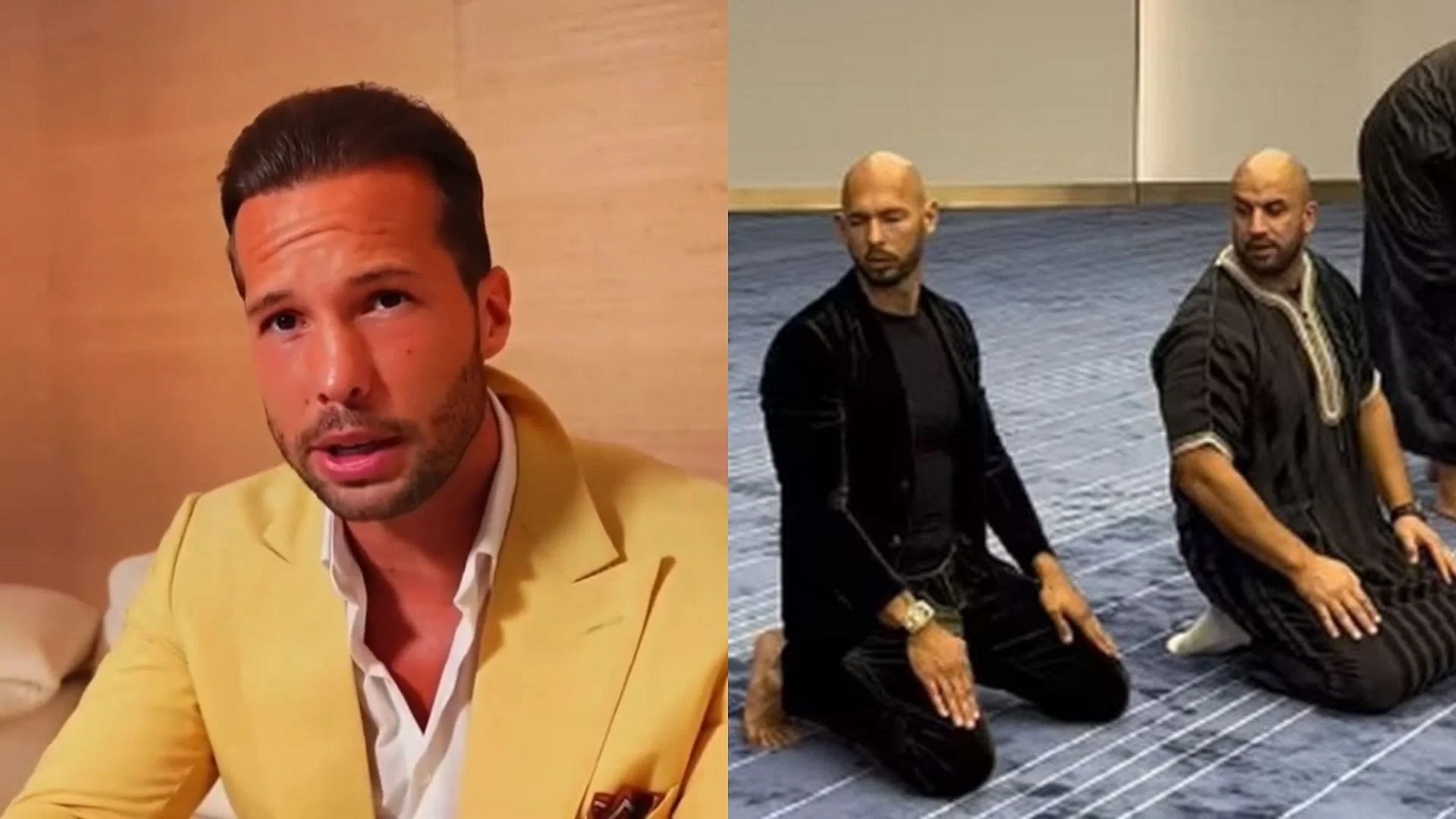Tristan Tate's Eclectic Spiritual Journey
Understanding Tristan Tate's Religious Views
Tristan Tate, a controversial figure known for his outspoken opinions and social media presence, has been open about his religious beliefs. While he does not adhere to any organized religion, Tate identifies as a spiritual person and believes in the power of faith.
Tate's spiritual beliefs are eclectic, drawing from various religious and philosophical traditions. He believes in the existence of a higher power and the importance of living a virtuous life. Tate emphasizes the significance of personal responsibility, self-discipline, and the pursuit of knowledge.
Tristan Tate's Religious Views
Tristan Tate, a controversial figure known for his outspoken opinions and social media presence, has been open about his religious beliefs. While he does not adhere to any organized religion, Tate identifies as a spiritual person and believes in the power of faith. Here are ten key aspects of Tristan Tate's religious views:
- Eclectic: Tate's spiritual beliefs draw from various religious and philosophical traditions.
- Higher power: He believes in the existence of a higher power.
- Virtue: Tate emphasizes the importance of living a virtuous life.
- Personal responsibility: He believes in the significance of personal responsibility.
- Self-discipline: Tate emphasizes the value of self-discipline.
- Knowledge: He believes in the pursuit of knowledge.
- Meditation: Tate practices meditation as a means of spiritual growth.
- Charity: He believes in the importance of giving to charity.
- Community: Tate values the importance of community and human connection.
- Evolution: He believes that his spiritual beliefs are constantly evolving.
These key aspects provide a glimpse into the diverse and complex nature of Tristan Tate's religious views. He is a spiritual person who believes in the power of faith and the importance of living a virtuous life. Tate's eclectic beliefs and emphasis on personal responsibility and self-discipline reflect his unique perspective on spirituality.
| Full Name | Tristan Tate |
|---|---|
| Date of Birth | July 15, 1988 |
| Place of Birth | Washington, D.C., U.S. |
| Nationality | American, British |
| Occupation | Kickboxer, entrepreneur, social media personality |
Eclectic
Tristan Tate's spiritual beliefs are eclectic, drawing from various religious and philosophical traditions. This eclecticism is a defining characteristic of Tate's spirituality, as it allows him to incorporate elements from different belief systems that resonate with him. Tate's eclectic approach to spirituality is evident in his emphasis on personal responsibility, self-discipline, and the pursuit of knowledge, which are common themes in many religious and philosophical traditions. Additionally, Tate's belief in the existence of a higher power and his emphasis on living a virtuous life reflect the influence of religious traditions on his spiritual beliefs.
The eclectic nature of Tristan Tate's religious beliefs is significant because it allows him to create a unique and personalized spiritual path. By drawing from various religious and philosophical traditions, Tate is able to tailor his beliefs to his own individual needs and experiences. This eclectic approach also allows Tate to be open to new ideas and perspectives, which contributes to his ongoing spiritual growth.
In conclusion, the eclectic nature of Tristan Tate's spiritual beliefs is a key component of his overall religious outlook. It allows him to incorporate elements from different belief systems that resonate with him, creating a unique and personalized spiritual path that is open to new ideas and perspectives.
Higher power
Tristan Tate's belief in the existence of a higher power is a central aspect of his religious views. This belief shapes his understanding of the world and his place within it. Tate's belief in a higher power is not tied to any specific religion or dogma, but rather is a personal and intuitive conviction.
- Connection to the Universe: Tate's belief in a higher power gives him a sense of connection to something greater than himself. He believes that there is a universal force or energy that permeates all of existence, and that this force is responsible for the order and harmony of the universe.
- Source of Guidance: Tate also sees the higher power as a source of guidance and support in his life. He believes that by being open to the higher power, he can receive insights and inspiration that help him navigate the challenges of life.
- Moral Compass: Tate's belief in a higher power also influences his moral compass. He believes that there are certain universal moral truths that are inherent in the nature of the higher power, and that these truths should guide our actions and behavior.
- Sense of Purpose: Tate's belief in a higher power gives him a sense of purpose and meaning in life. He believes that he is part of something larger than himself, and that his actions have a ripple effect on the world around him.
In conclusion, Tristan Tate's belief in the existence of a higher power is a fundamental aspect of his religious views. This belief shapes his understanding of the world, gives him a sense of connection and guidance, influences his moral compass, and provides him with a sense of purpose and meaning in life.
Virtue
In Tristan Tate's religious views, virtue holds a central position. He believes that living a virtuous life is essential for personal growth, fulfillment, and spiritual well-being. Tate defines virtue as a set of positive moral qualities, such as honesty, integrity, courage, and compassion, that guide one's actions and behavior.
According to Tate, living a virtuous life is not merely about following a set of rules or adhering to societal norms. Instead, it is about embodying these virtues in one's daily life and making choices that align with one's values. Tate believes that by cultivating virtue, individuals can create a more meaningful and fulfilling life for themselves and contribute positively to the world around them.
Tate's emphasis on virtue is evident in his teachings and his own personal life. He frequently speaks about the importance of honesty, integrity, and self-discipline, and he encourages his followers to strive for excellence in all that they do. Tate believes that by living a virtuous life, individuals can overcome challenges, achieve their goals, and make a positive impact on the world.
Personal responsibility
In Tristan Tate's religious views, personal responsibility holds a central position. Tate believes that individuals are responsible for their own actions and choices, and that they cannot blame others or external circumstances for their failures or misfortunes. This emphasis on personal responsibility is deeply rooted in Tate's belief in free will and the power of individual agency.
According to Tate, taking personal responsibility means acknowledging our mistakes and learning from them, rather than making excuses or blaming others. It means being accountable for our choices and actions, and understanding that we have the power to shape our own lives. Tate believes that by taking personal responsibility, individuals can develop a strong sense of self-reliance, resilience, and determination.
Tate's emphasis on personal responsibility is evident in his teachings and his own personal life. He frequently speaks about the importance of taking ownership of one's actions and choices, and he encourages his followers to be proactive and to take responsibility for their own lives. Tate believes that by taking personal responsibility, individuals can overcome challenges, achieve their goals, and live a more fulfilling and meaningful life.
Self-discipline
In Tristan Tate's religious views, self-discipline holds a central position. Tate believes that self-discipline is essential for personal growth, fulfillment, and spiritual well-being. He defines self-discipline as the ability to control one's thoughts, emotions, and actions in order to achieve one's goals and live a virtuous life.
- Overcoming Challenges: Self-discipline enables individuals to overcome challenges and obstacles in their lives. By controlling their impulses and desires, they can stay focused on their long-term goals and make choices that align with their values.
- Developing Willpower: Self-discipline helps individuals develop willpower and resilience. Through consistent practice, they can strengthen their ability to resist temptations and distractions, and to persist in the face of adversity.
- Cultivating Inner Strength: Self-discipline contributes to the cultivation of inner strength and self-mastery. By controlling their minds and emotions, individuals can develop a strong sense of self-reliance and self-confidence.
- Achieving Spiritual Growth: Self-discipline is essential for spiritual growth and development. By controlling their thoughts and desires, individuals can create a clear and focused mind, which is conducive to meditation, reflection, and spiritual practices.
Tate's emphasis on self-discipline is evident in his teachings and his own personal life. He frequently speaks about the importance of self-control and self-mastery, and he encourages his followers to develop a strong work ethic and to strive for excellence in all that they do. Tate believes that by cultivating self-discipline, individuals can unlock their full potential and live a more meaningful and fulfilling life.
Knowledge
In Tristan Tate's religious views, the pursuit of knowledge holds a central position. Tate believes that knowledge is essential for personal growth, fulfillment, and spiritual well-being. He defines knowledge as the understanding of the world and its workings, encompassing both practical knowledge and spiritual wisdom.
According to Tate, the pursuit of knowledge is not merely about accumulating facts and information. Instead, it is about developing a deep understanding of the world and our place within it. Tate believes that by acquiring knowledge, individuals can make more informed decisions, solve problems more effectively, and live more meaningful and fulfilling lives.
Tate's emphasis on the pursuit of knowledge is evident in his teachings and his own personal life. He frequently speaks about the importance of education, reading, and self-improvement. Tate encourages his followers to be curious and to never stop learning. He believes that by pursuing knowledge, individuals can unlock their full potential and live a more enlightened and fulfilling life.
Meditation
In Tristan Tate's religious views, meditation holds a central position as a means of spiritual growth. Tate believes that meditation allows individuals to connect with their inner selves, cultivate mindfulness, and access higher states of consciousness.
According to Tate, meditation is not merely a relaxation technique or a way to reduce stress. Instead, it is a powerful tool for spiritual development that can lead to profound personal transformation. Through meditation, individuals can learn to quiet their minds, focus their thoughts, and cultivate a deep sense of inner peace and tranquility.
Tate encourages his followers to incorporate meditation into their daily lives as a means of connecting with their spirituality and unlocking their full potential. He believes that by practicing meditation regularly, individuals can develop greater self-awareness, compassion, and wisdom.
The connection between meditation and Tristan Tate's religious views is significant because it reflects his emphasis on personal growth, self-awareness, and spiritual development. Meditation is seen as a tool that can help individuals transcend their limitations and achieve a higher level of consciousness.
Charity
In Tristan Tate's religious views, charity is seen as an essential aspect of spiritual growth and personal fulfillment. Tate believes that giving to charity is not merely an act of kindness, but rather a way to connect with others, cultivate compassion, and make a positive impact on the world.
- Expression of Compassion: Charity is seen as a way to express compassion and empathy for those less fortunate. By giving to charity, individuals can demonstrate their concern for the well-being of others and contribute to creating a more just and equitable society.
- Spiritual Growth: Tate believes that giving to charity is not only beneficial for the recipients but also for the giver. Through the act of giving, individuals can cultivate a sense of humility, gratitude, and connection with others. This, in turn, contributes to their spiritual growth and well-being.
- Social Responsibility: Tate emphasizes the importance of social responsibility and believes that individuals have a duty to give back to their communities. By supporting charitable causes, individuals can make a positive impact on society and contribute to the common good.
- Personal Fulfillment: Tate believes that giving to charity can bring a sense of personal fulfillment and meaning to life. By helping others, individuals can experience a sense of purpose and satisfaction that transcends material possessions or personal achievements.
The connection between charity and Tristan Tate's religious views is significant because it reflects his emphasis on compassion, social responsibility, and personal growth. Charity is seen as a way to connect with others, make a positive impact on the world, and cultivate a sense of fulfillment and purpose in life.
Community
In the context of Tristan Tate's religious views, the concept of community holds significant importance. Tate emphasizes the value of human connection and belonging, recognizing the essential role that community plays in fostering personal growth and spiritual well-being.
- Sense of Belonging: Community provides a sense of belonging and support, allowing individuals to feel connected to something larger than themselves. Within a community, individuals can find acceptance, validation, and a shared sense of purpose.
- Spiritual Growth: Community fosters spiritual growth by creating a supportive environment for individuals to explore their beliefs and practices. Through shared rituals, ceremonies, and teachings, community members can deepen their spiritual understanding and connection to the divine.
- Moral Support: Community offers moral support and guidance, helping individuals navigate ethical challenges and make decisions aligned with their values. By sharing experiences and insights, community members can provide encouragement, accountability, and a sense of direction.
- Social Responsibility: Community promotes a sense of social responsibility and encourages individuals to contribute to the well-being of others. Through community service, outreach programs, and charitable initiatives, community members can make a positive impact on their surroundings and cultivate a spirit of compassion and unity.
The connection between community and Tristan Tate's religious views highlights the importance of human connection and belonging in his spiritual framework. Community serves as a vital wadah for personal growth, spiritual exploration, moral support, and social responsibility, contributing to the overall well-being and fulfillment of individuals within the community.
Evolution
Tristan Tate's spiritual beliefs are not static but rather dynamic and ever-evolving. This facet of his religious views underscores the notion that spiritual growth is an ongoing process, characterized by a willingness to question, explore, and refine one's beliefs and practices.
- Openness to New Ideas: Tate embraces an open-minded approach to spirituality, recognizing that there is always more to learn and discover. He is receptive to new ideas, perspectives, and experiences that challenge his existing beliefs andpersonal growth.
- Adaptation to Life Experiences: Tate's spiritual beliefs evolve in response to his life experiences, challenges, and personal journey. Through introspection and reflection, he integrates lessons learned from both positive and negative experiences into his spiritual framework, allowing for a deeper understanding of himself and his place in the world.
- Rejection of Dogma: Tate rejects the idea of adhering to rigid dogma or fixed religious doctrines. He believes that spirituality is a personal and subjective experience, and that individuals should have the freedom to shape their own beliefs and practices based on their own unique needs and experiences.
- Continuous Learning and Exploration: Tate views spiritual growth as an ongoing pursuit of knowledge and understanding. He actively seeks out opportunities to learn from diverse spiritual traditions, philosophies, and practices, incorporating insights that resonate with him into his evolving spiritual beliefs.
In conclusion, Tristan Tate's belief that his spiritual beliefs are constantly evolving highlights the dynamic nature of his religious views. His openness to new ideas, willingness to adapt based on life experiences, rejection of dogma, and commitment to continuous learning contribute to a spiritual journey that is characterized by growth, exploration, and personal transformation.
Frequently Asked Questions on "Tristan Tate Religion"
This section addresses common questions and misconceptions regarding Tristan Tate's religious views, providing informative answers to enhance understanding of this topic.
Question 1: What is Tristan Tate's religious affiliation?
Tristan Tate does not adhere to any organized religion and identifies as a spiritual person with eclectic beliefs, drawing from various religious and philosophical traditions to shape his personal spiritual path.
Question 2: What are the core tenets of Tristan Tate's spiritual beliefs?
Tate's spiritual beliefs emphasize personal responsibility, self-discipline, the pursuit of knowledge, living a virtuous life, and the importance of community and human connection. He believes in the existence of a higher power and places value on charity, meditation, and the ongoing evolution of his spiritual beliefs.
Question 3: How does Tristan Tate define spirituality?
Tate views spirituality as a personal and subjective experience, distinct from organized religion. He believes that spirituality involves a quest for meaning, purpose, and connection to something greater than oneself, and that this journey is unique to each individual.
Question 4: What is the significance of meditation in Tristan Tate's spiritual practices?
Tate incorporates meditation into his daily routine as a means of cultivating self-awareness, inner peace, and a deeper connection to his spiritual self. He believes that meditation allows individuals to access higher states of consciousness and facilitates personal growth and transformation.
Question 5: How does Tristan Tate's belief in personal responsibility align with his spiritual views?
Tate believes that individuals have the power to shape their own lives and are responsible for their choices and actions. This emphasis on personal responsibility empowers individuals to take ownership of their spiritual journey and actively participate in their own growth and evolution.
Question 6: What is the role of community in Tristan Tate's spiritual framework?
Tate recognizes the importance of community and human connection in fostering spiritual growth. He believes that a supportive community provides a sense of belonging, shared values, and opportunities for collective spiritual exploration and practices.
Summary of key takeaways or final thought: Tristan Tate's religious views are characterized by an eclectic approach, emphasizing personal responsibility, self-discipline, and spiritual evolution. He embraces a dynamic and subjective understanding of spirituality, recognizing the unique nature of each individual's journey toward meaning and purpose.
Transition to the next article section: This concludes the frequently asked questions on Tristan Tate's religious views. For further exploration of this topic, navigate to the next section, where we delve into a comprehensive examination of his beliefs and their implications.
Tips Related to "Tristan Tate Religion"
This section provides valuable tips related to Tristan Tate's religious views, offering insights and practical advice for further exploration of this topic.
Tip 1: Embrace an Open Mind: Approach Tristan Tate's religious views with an open and receptive mindset. Avoid dismissing or judging his beliefs without first seeking a deeper understanding of his perspective.
Tip 2: Contextualize Tate's Beliefs: Recognize that Tristan Tate's religious views are shaped by his personal experiences, cultural background, and philosophical influences. Consider these factors to gain a more comprehensive understanding of his beliefs.
Tip 3: Seek Diverse Perspectives: Engage with multiple sources and viewpoints on Tristan Tate's religious views. This includes reading articles, watching interviews, and listening to podcasts that offer a range of perspectives.
Tip 4: Respect Boundaries: While it's important to engage in respectful discussions about Tristan Tate's religious views, be mindful of others' beliefs and avoid imposing your own views or attempting to convert others.
Tip 5: Focus on Common Ground: Identify areas of common ground between Tristan Tate's religious views and other spiritual or philosophical traditions. This can help foster understanding and dialogue.
Tip 6: Prioritize Authenticity: When discussing Tristan Tate's religious views, strive for authenticity and honesty. Avoid sensationalizing or distorting his beliefs for the sake of creating a more captivating narrative.
Tip 7: Seek Credible Sources: Ensure that the information you access about Tristan Tate's religious views comes from credible sources, such as reputable news outlets, academic journals, or official statements.
Tip 8: Engage in Thoughtful Analysis: Encourage critical thinking and analysis of Tristan Tate's religious views. Consider the strengths and weaknesses of his arguments, and evaluate the evidence and reasoning behind his beliefs.
Summary of key takeaways or benefits: By following these tips, you can enhance your understanding of Tristan Tate's religious views, engage in more informed discussions, and cultivate a deeper appreciation for the diversity of spiritual beliefs.
Transition to the article's conclusion: These tips provide a valuable foundation for further exploration of Tristan Tate's religious views. Embracing an open mind, seeking diverse perspectives, and engaging in thoughtful analysis will empower you to navigate this topic with greater understanding and nuance.
Conclusion
Tristan Tate's religious views offer a unique perspective on spirituality, emphasizing personal responsibility, self-discipline, and the pursuit of knowledge. His eclectic approach, drawing from various religious and philosophical traditions, underscores the fluidity and dynamism of spiritual beliefs.
Tate's rejection of dogma and embrace of ongoing spiritual evolution invite us to question our own beliefs and embark on a journey of self-discovery. By understanding the nuances of his religious views, we gain insights into the complexities of spirituality and the diverse ways individuals seek meaning and purpose in life.
Uncovering The Impact And Legacy Of Stacy Arthur's Untimely Passing
Unveiling The Extraordinary Life And Music Of Blake Shelton
Dive Into The Heart Of New Orleans Music: Unveiling The Secrets Of Lovee Duboef

“I’m very happy for my brother” Tristan Tate opens up about Andrew

Tristan Tate dating history Who has the entrepreneur dated? The US Sun

Tristan Tate Religion Is He A Muslim Or Christian?

Who is Tristan Tate? Followchain

Tristan Tate gives a oneword reaction to Jake Paul's ‘Happy 4th of
ncG1vNJzZmiqlaGwo3rApqpsZpSetKrAwKWmnJ2Ro8CxrcKeqmebn6J8tb7IrKuapl2prrWxjKucpaGXnryvesetpKU%3D